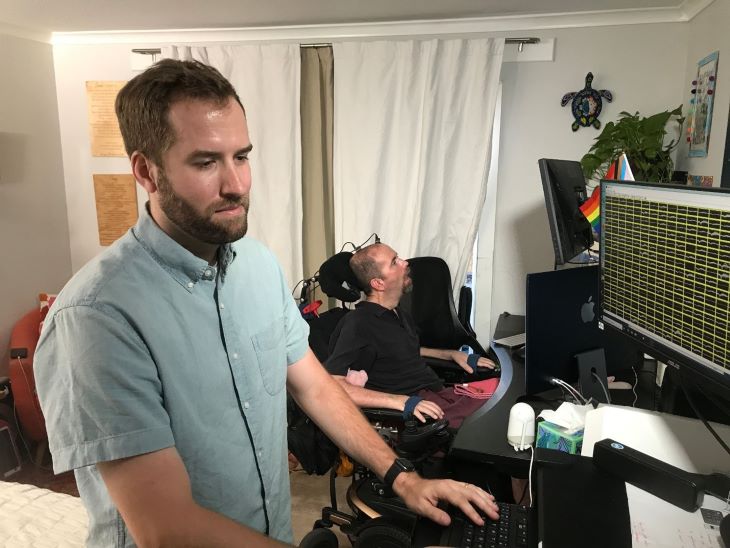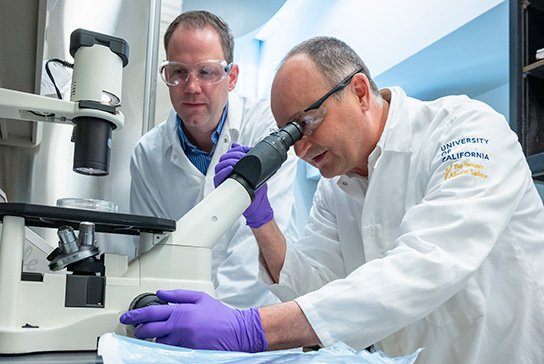Brain-computer interface study wins a top national clinical research award
Neurosurgeon David Brandman recognized for impactful clinical research to restore speech to ALS patients
UC Davis Health is pleased to announce that Neurosurgeon David Brandman and his team at UC Davis Neuroprosthetics Lab were awarded The Herbert Pardes Clinical Research Excellence Award. It is the most prestigious honor awarded by the Clinical Research (CR) Forum, a non-profit association of top clinical research experts and thought leaders from the nation’s leading academic health centers.
Brandman and his team were recognized for their groundbreaking work in developing a new brain-computer interface (BCI) that translates brain signals into speech with up to 97% accuracy — the most accurate system of its kind. Their work was published in the New England Journal of Medicine.
In February, the CR Forum selected Brandman for a 2025 Top Ten Clinical Research Achievement Award. This award honors 10 outstanding clinical research studies published in peer-reviewed journals in the previous year. The BCI study was recognized during the Awards ceremony on April 14.
“Our team is very honored by this recognition. It means a lot to us that our study was not only selected among the nation’s best published clinical research studies, but it has also won The Herbert Pardes Clinical Research Excellence Award!” said Brandman, co-director of the Neuroprosthetics Lab. He is an assistant professor in the UC Davis Department of Neurological Surgery.
The BCI study’s co-principal investigator is UC Davis Neuroscientist Sergey Stavisky. Stavisky is an assistant professor in the Department of Neurological Surgery and co-director of the Neuroprosthetics Lab. The study’s lead author is Nicholas Card. He is a postdoctoral scholar at the UC Davis Department of Neurological Surgery.
A brain-computer interface that translated brain signals to speech
The new BCI technology is being developed to restore communication for people who can’t speak due to paralysis or neurological conditions like amyotrophic lateral sclerosis (ALS). It can interpret brain signals when the user tries to speak and turns them into text that is “spoken” aloud by the computer.
In July 2023, Brandman implanted sensors in the brain of a man with severely impaired speech due to ALS. The man was able to communicate his intended speech within minutes of activating the system.
“Our work demonstrates the most accurate speech neuroprosthesis (device) ever reported. The technology is transformative because it provides hope for people who want to speak but can’t. I hope that technology like this speech BCI will help future patients speak with their family and friends,” Brandman said.

The Herbert Pardes Clinical Research Excellence Award
The Herbert Pardes Clinical Research Excellence Award is named in honor of CR Forum Board Vice Chair Herbert Pardes for his profound impact on clinical research and academic medicine. It is awarded to the research study that best shows a high degree of innovation and creativity, advances science, and has an impact upon human disease.
“This study is spectacular, in that not only can this man communicate with his family and maintain his livelihood, but he is actually able to speak using recordings of his own voice ,” said Harry P. Selker, chair of the Clinical Research Forum and dean of Tufts Clinical and Translational Science Institute at Tufts University.
UC Davis Health Vice Dean for Research Kim E. Barrett nominated Brandman for this award.
"The work done by Dr. Brandman and his team, including his research partner Sergey Stavisky, has been nothing short of remarkable. The technologies they have developed offer real hope to change the lives of those who have been robbed of their power to speak intelligibly by diseases such as ALS,” said Barrett, distinguished professor of physiology and membrane biology at UC Davis.
The BCI study is part of a BrainGate2 clinical trial. The trial is still enrolling participants. Brandman is the trial’s site-responsible principal investigator. A complete list of study’s coauthors and funders is available in the New England Journal of Medicine article.
The award comes with a $7,500 prize.




